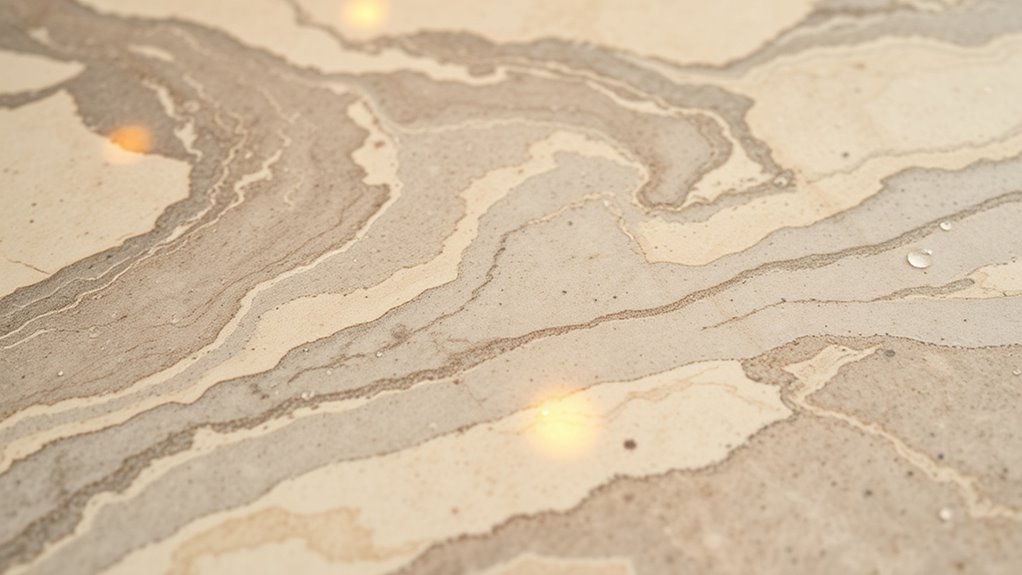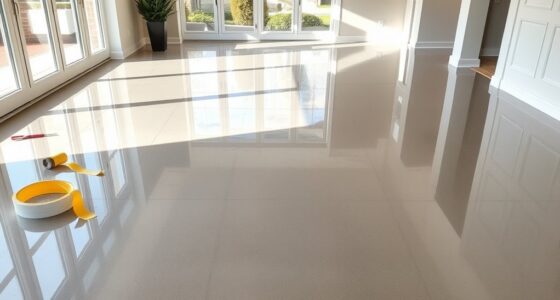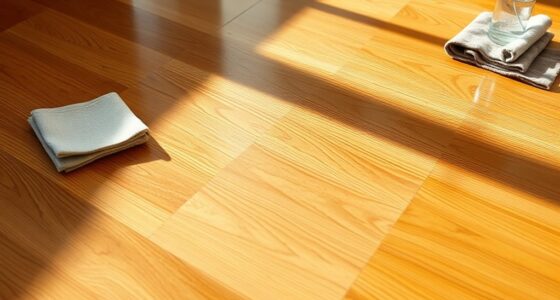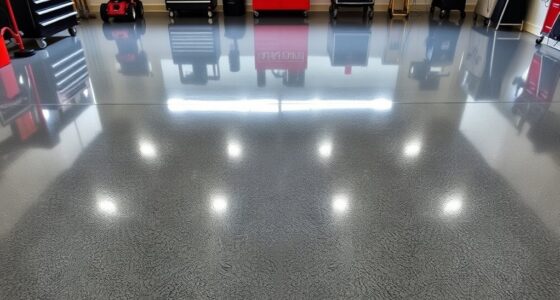To keep your natural stone looking its best in just 15 minutes a day, start by wiping down surfaces with a soft cloth dampened with warm water to remove dust and debris. Quickly address spills with a gentle, pH-neutral cleaner suited for your stone type. Regularly inspect for stains or wear, and reseal as needed to maintain protection. Stay consistent, and you’ll preserve their beauty and durability—continue with the tips below to master long-term care.
Key Takeaways
- Wipe the surface daily with a soft cloth or mop dampened with warm water to remove dust and prevent buildup.
- Use a pH-neutral, stone-safe cleaner for quick spill cleanup to prevent stains and damage.
- Avoid acidic or abrasive cleaners that can harm mineral surfaces like marble or limestone.
- Inspect the surface regularly for stains or wear, addressing issues promptly for long-term preservation.
- Reseal as recommended by the manufacturer, typically every 1-3 years, to maintain optimal protection.
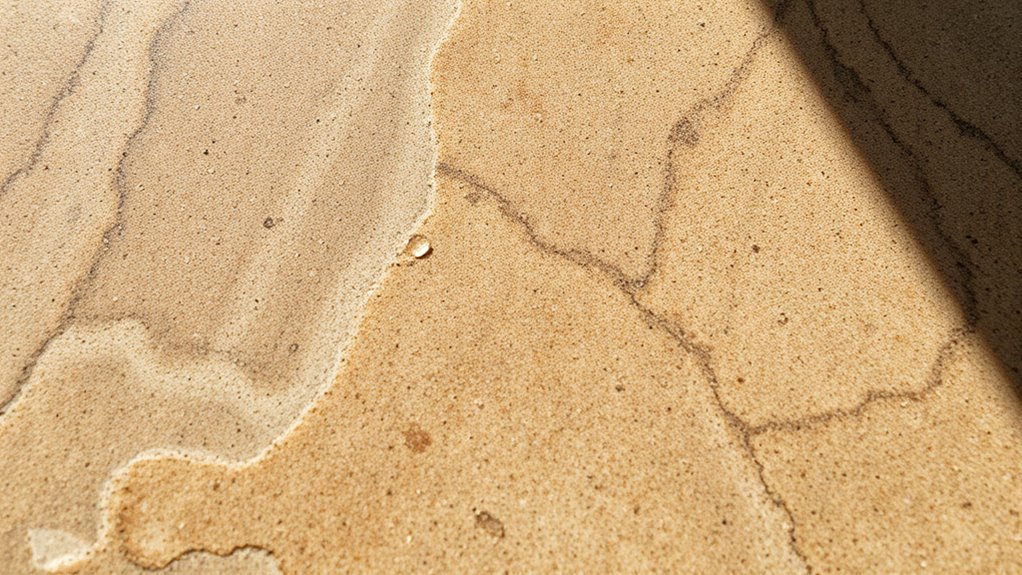
Natural stone has been a trusted material for centuries, prized for its durability, beauty, and timeless appeal. When it comes to maintaining its appearance, understanding sealing techniques plays an essential role. Proper sealing helps protect your stone surfaces from stains, spills, and everyday wear, ensuring they stay vibrant for years to come. The process involves applying a quality sealant that penetrates the stone’s surface, creating a barrier against moisture and dirt. Different sealing techniques exist, but the most effective ones involve thorough cleaning first, followed by an even application of the sealant. You’ll want to choose a sealant suitable for your specific type of stone, whether it’s granite, marble, or limestone, and follow the manufacturer’s instructions carefully. Regular resealing, typically every one to three years, keeps the protective layer intact and maximizes the longevity of your stone. Additionally, understanding the mineral composition of your natural stone also helps you care for it properly. Each type of stone has a unique mineral makeup that influences how it reacts to cleaning agents and sealing products. For example, marble contains calcium carbonate, which is more susceptible to etching from acidic substances, so you need to be cautious with cleaning solutions. Granite, with its quartz and feldspar content, is more resistant to acids but still benefits from consistent sealing and gentle cleaning. Knowing what minerals are present guides you in selecting the right cleaning products—mild, pH-neutral cleaners are generally safest—and in avoiding harsh chemicals that could damage the surface or compromise the sealant. To keep your natural stone looking its best with just a 15-minute daily routine, start by wiping down surfaces with a soft cloth or mop dampened with warm water. This simple step removes dust and prevents buildup that can dull the surface. For spots or spills, act quickly using a gentle, stone-safe cleaner. Avoid acidic or abrasive cleaners that can harm the mineral structure or break down the sealant. Periodically, inspect your stone for signs of wear or staining, and if necessary, reseal it following the recommended technique for your specific stone type. By understanding the mineral composition, you’ll know which cleaning methods suit your surface, and by mastering sealing techniques, you’ll protect your investment. This straightforward daily routine, combined with proper sealing, keeps your natural stone surfaces looking beautiful and well-maintained without spending hours on upkeep.
Frequently Asked Questions
Can Natural Stone Surfaces Withstand Acidic Cleaning Agents?
No, natural stone surfaces can’t withstand acidic cleaning agents, as they can cause acid damage over time. You should avoid using acidic cleaners like vinegar or lemon on your natural stone to prevent etching and dullness. Instead, opt for pH-neutral cleaning agents designed specifically for stone surfaces. This way, you protect your stone from unnecessary damage and keep it looking beautiful for years.
How Often Should I Reseal Natural Stone Countertops?
Sealing your natural stone countertops is like giving them a protective shield; generally, you should reseal every 1 to 3 years. The sealing frequency depends on your maintenance schedule and how much use your surfaces get. Regularly inspect for stains or dullness, and reseal when needed. Staying consistent with this helps your stone stay beautiful and durable, making upkeep simple and effective.
Are There Eco-Friendly Cleaning Options for Natural Stone?
Yes, you can find eco-friendly cleaning options for natural stone. Opt for biodegradable cleaners that are gentle yet effective, or try DIY cleaning solutions using ingredients like vinegar, baking soda, and water. Just be cautious with acidic ingredients like vinegar, which can damage natural stone over time. Regularly using these eco-friendly options helps maintain your stone’s beauty while minimizing environmental impact.
What Are Common Mistakes to Avoid When Cleaning Natural Stone?
When cleaning natural stone, avoid using abrasive cleaners that can scratch the surface. Make sure to maintain the pH balance by using gentle, pH-neutral solutions instead of acidic or alkaline products. Don’t forget to use soft cloths or sponges—never rough scrubbers—and avoid letting spills sit for too long, especially acidic substances like vinegar or citrus. These mistakes can damage your stone’s finish and longevity.
How Do I Remove Stubborn Stains From Natural Stone Surfaces?
Imagine you’ve got a coffee stain on your marble countertop. To remove stubborn stains, you should start with gentle stain removal techniques, like applying a poultice made of baking soda and water, and letting it sit overnight. For natural stain treatments, avoid acidic cleaners that can damage the stone. Always test in a small area first, and repeat as needed for best results.
Conclusion
Think of your natural stone as the heart of your home’s story. With just 15 minutes daily, you’re nurturing its life and beauty—like tending a delicate garden. A simple, consistent clean is the gentle rain that keeps it vibrant and resilient. Embrace this daily ritual, and your stone will stand as a timeless symbol of care and elegance, whispering silent tales of your dedication for years to come.
